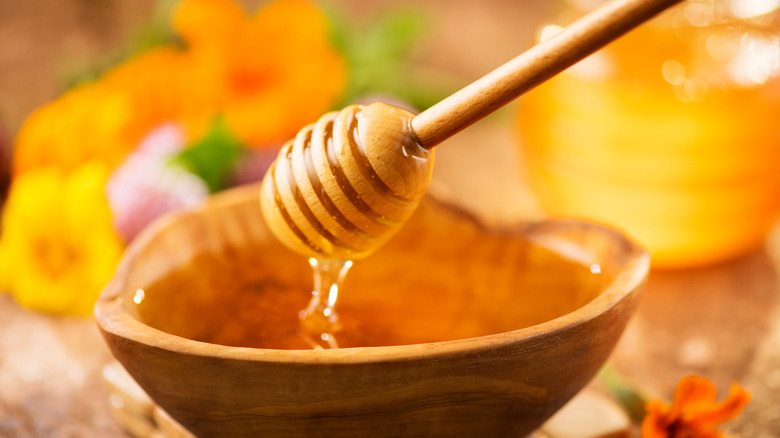The Real Reason Honey Never Goes Bad
Does anyone else remember that golden honey bear that everyone from your grandma to your next-door neighbor seemed to have in their pantry? Honey wasn't once the buzzy (no pun intended) ingredient that it is now, touting a long list of health benefits from eating it or putting it on your body. Medical News Today reports it has some definite benefits that sugar doesn't.
It's available in a variety of artisanal styles from orange blossom to wildflower and even the super-spendy Manuka honey that seems to top them all. Each type of honey has a distinct color and taste (though it's safe to say they're all pretty sweet!) which depends on the type of flower the bees were buzzing around when they collected the nectar to make the honey. If you can, we recommend sampling a few different varieties of honey and letting their natural essence guide you toward using it in a marinade or as the star of the dish.
The good news is there's no shortage of ways to use more honey in the kitchen. From salad dressings and cookies to honey-poached fruits and even roast duck, let your cravings be your guide. Now that you're inspired to finally use that jar that's been sitting on the shelf, how long can honey last? Turns out, possibly forever.
Honey has an ancient past
Aside from honey's culinary uses, honey has a long history of being used for medicinal purposes as well. Even early ancient Egyptians were using honey for medicinal purposes — and the craziest part is the honey that's been preserved in their pyramids and tombs for thousands of years is still safe to eat today, according to Smithsonian magazine.
As the publication also notes, there are a few factors contributing to the magic and mystery of honey's eternal shelf life. First, even though honey may seem moist because of its texture, chemically speaking, it actually has a low moisture level. Honey is made up of natural sugar and will readily absorb any moisture from the environment and even during dry times of the year, there is moisture to be pulled from the air.
Bacteria and other microorganisms that cause mold cannot survive without water, so as long as your honey is properly sealed, these bacteria cannot thrive. Honey also has a pretty low pH, meaning that it is relatively acidic despite its sugary sweet taste. As explained in a 2007 scholarly paper published by African Health Sciences, any bacteria that may find a way in are quickly killed off due to the acidic environment.
The secret is in the bees
Chemical properties aside, Smithsonian magazine mentions some hidden magic from bees that helps with honey's ultra-long shelf life. The process of making the honey from nectar in the honeycomb naturally lowers its moisture content due to the flapping of the bees' wings. Bees also have a special enzyme in their stomachs that helps to turn nectar from flowers into golden honey, and that same enzyme produces a tiny amount of hydrogen peroxide in the process which helps keep bacteria at bay.
The key takeaway here is that while honey has tons of natural properties to fend off expiration and mold, it's up to you to keep it in the perfect environment. MasterClass states that maintaining a low moisture content is key to a long shelf-life. Storing in your pantry should be just fine as honey does not need refrigeration or freezing to stay fresh.
Honey can be added to everything from a bowl of oatmeal or a cup of coffee to salad dressings, bread, and even ice cream. You may have heard that the bee population is declining, and it could spell trouble for a lot of the foods we know and love. So the next time you pass by some local honey at the farmers market, grab a jar to support your local farmers and do your part to protect the bees. You never know when it will come in handy — and you don't have to worry about it expiring.


